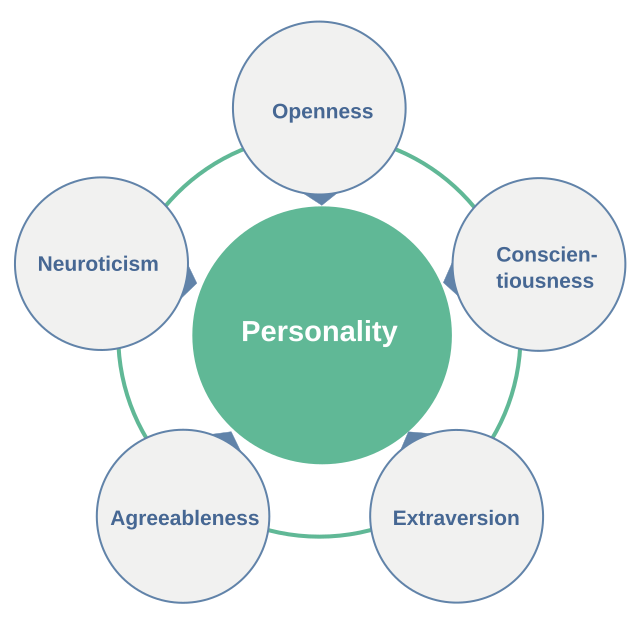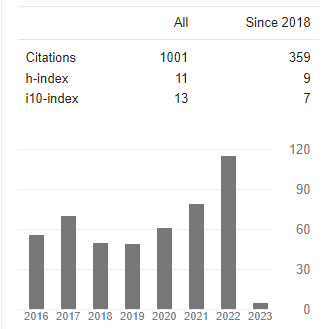Impact of Personality Traits on Achievement Motivation Among Undergraduate Students
Abstract
The present study examines the impact of personality traits on achievement motivation among undergraduate students. Using the Five-Factor Model, the study explores how traits like conscientiousness, neuroticism, extraversion, openness, and agreeableness influence students' drive to succeed academically. A sample of 560 undergraduate students from colleges affiliated to Guru Nanak Dev University, Amritsar, was selected through a random sampling method. Data were collected using the Achievement Motivation Scale and the Big Five Personality Inventory. The findings reveal that conscientiousness and agreeableness significantly enhance achievement motivation, with conscientious students demonstrating strong goal-setting and perseverance. Conversely, neuroticism negatively impacts motivation due to emotional instability and fear of failure. Extraversion and openness show no significant effects, suggesting that their influence may be context-dependent. The results underscore the importance of personality-based interventions in academic settings. Strategies such as emotional regulation training and structured goal-setting programs can help students, particularly those with high neuroticism or low conscientiousness, improve their academic performance. The study highlights the need for educators and policymakers to consider personality traits when designing instructional methods to foster student success.
Downloads
References
Besser, A., & Shackelford, T. K. (2021). Mediation of personality on academic achievement through motivational orientations. Personality and Individual Differences, 169, 110011. https://doi.org/10.1016/j.paid.2020.110011
Bipp, T., Kleingeld, A., & van den Tooren, M. (2019). Goal orientation and personality traits as predictors of job crafting: A person-centered approach. Personality and Individual Differences, 147, 66–71. https://doi.org/10.1016/j.paid.2019.04.034
Bledsoe, T. S., & Baskin, J. J. (2014). Recognizing student fear: The elephant in the classroom. College Teaching, 62(1), 32–41. https://doi.org/10.1080/87567555.2013.831022
Costa, P. T., McCrae, R. R., & Löckenhoff, C. E. (2023). Personality traits in adulthood: Development, assessment, and outcomes. Annual Review of Psychology, 74, 123–152.
Denissen, J. J. A., Geenen, R., van Aken, M. A., Gosling, S. D., & Potter, J. (2023). The big five inventory: Cross-cultural adaptation and measurement invariance in large samples. Journal of Personality and Social Psychology, 114(5), 1011–1027.
DeYoung, C. G. (2015). Openness/Intellect: A dimension of personality reflecting cognitive exploration. Handbook of Personality: Theory and Research, 369–399.
Ferguson, E., & Bibby, P. A. (2021). Personality and performance: Neuroticism and conscientiousness in changing environments. Personality and Individual Differences, 174, 110694.
Hirsh, J. B., Kang, S. K., & Bodenhausen, G. V. (2023). Emotional instability and goal motivation: How neuroticism shapes achievement behavior. Journal of Personality, 91(1), 32–49.
Judge, T. A., & Zapata, C. P. (2015). The interactive effects of extraversion and conscientiousness on academic motivation and performance. Journal of Applied Psychology, 100(2), 583–597. https://doi.org/10.1037/a0038547
Judge, T. A., Simon, L. S., & Hurst, C. (2021). Conscientiousness and performance: Revisiting relationships between traits and goal striving in job contexts. Journal of Applied Psychology, 106(4), 599–611.
Kandler, C., Zimmermann, J., & McAdams, D. P. (2021). The influence of life experiences and personality on motivation: A cross-national study. Personality and Social Psychology Bulletin, 47(3), 437–452.
Kaufman, S. B., Quilty, L. C., Grazioplene, R. G., Hirsh, J. B., Gray, J. R., Peterson, J. B., & DeYoung, C. G. (2016). Openness to experience and intellect differentially predict creative achievement in the arts and sciences. Journal of Personality, 84(2), 248–258. https://doi.org/10.1111/jopy.12156
Komarraju, M., Karau, S. J., & Schmeck, R. R. (2009). Role of the Big Five personality traits in predicting college students’ academic motivation and achievement. Learning and Individual Differences, 19(1), 47–52. https://doi.org/10.1016/j.lindif.2008.07.001
Komarraju, M., Swanson, J. A., & Nadler, D. R. (2014). Increased academic motivation: Impacts of positive student-teacher relationships and the mediating role of personality traits. Journal of Educational Psychology, 106(1), 242–253. https://doi.org/10.1037/a0033472
Mammadov, S. (2022). Big Five personality traits and academic achievement: A meta-analytic review. Personality and Individual Differences, 186, 111356. https://doi.org/10.1016/j.paid.2021.111356
McCabe, K. O., & Fleeson, W. (2021). The dynamics of conscientiousness: The role of goal prioritization. Journal of Research in Personality, 90, 104035.
McCrae, R. R., & Costa, P. T., Jr. (1997). Personality trait structure as a human universal. American Psychologist, 52(5), 509–516. https://doi.org/10.1037/0003-066X.52.5.509
Park, S. W., Schmidt, J. A., & Little, T. D. (2022). Personality and motivation: Understanding the interaction of traits and goals. Educational Psychology Review, 34(3), 895–917.
Poropat, A. E. (2009). A meta-analysis of the five-factor model of personality and academic performance. Psychological Bulletin, 135(2), 322–338. https://doi.org/10.1037/a0014996
Roberts, B. W., Luo, J., Briley, D. A., Chow, P. I., & Su, R. (2022). Personality trait development in adulthood: Contributions of personality to success. Annual Review of Developmental Psychology, 4, 321–345.
Smillie, L. D., Yeo, G. B., Furnham, A., & Jackson, C. J. (2021). The role of agreeableness in academic motivation and performance: A social adaptation perspective. Journal of Research in Personality, 94, 104126. https://doi.org/10.1016/j.jrp.2021.104126
Soto, C. J., & Jackson, J. J. (2022). A new big five inventory: Reliability and implications for research. Personality and Social Psychology Bulletin, 48(2), 270–288.
Soto, C. J., John, O. P., Gosling, S. D., & Potter, J. (2020). The developmental structure of personality traits: Testing age and sex differences in the big five across the life span. Developmental Psychology, 56(10), 1999–2021.
Wilt, J., & Revelle, W. (2021). Openness to experience and its facets: Intellectual engagement and creativity. Psychological Bulletin, 147(5), 389–421.

Copyright (c) 2025 Ranjit Kumar, Amarjit kaur

This work is licensed under a Creative Commons Attribution 4.0 International License.














